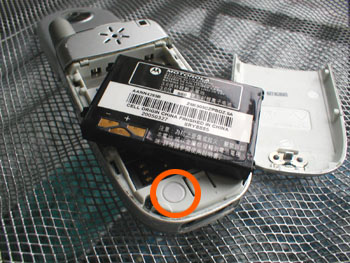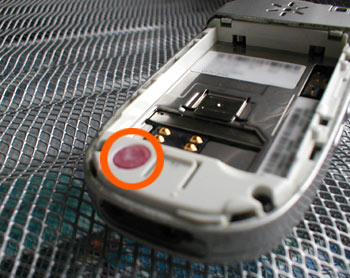Open the case of your mobile (cell) phone. Do you see a round white sticker, similar to that in the first photo below?

This is a water damage sticker, which changes colour if moisture gets into this bit of the phone, and will be used to void your warranty if your phone stops working for any reason.
A single droplet of water placed on the sticker turns it bright red (in the case of my phone, anyway):

WikiHow’s ‘How to save a wet cell phone’ (found via Consumerist) recommends that you:
“Place a piece of satin finish scotch tape over your water damage sticker before you drop your cell phone in the water to prevent the water damage sticker from voiding your warranty… Remove the tape if you ever have to return your phone for repairs or warranty.”
Now, it’s a clever idea on the part of the phone companies, and presumably water-damaged phones being returned under warranty were enough of a problem to make such stickers ‘necessary’.
However, we all know that in practice, any non-working phone where the sticker has changed colour will be immediately classified as ‘water-damaged’ and the customer’s rights voided, even if the actual phone was independently defective.
As a designer, I would much prefer to look at the problem as “How can we improve the sealing of phones so that water ingress is no longer a major problem?” than “How can we design something to cover our backs and shift all the blame onto the user for our design fault?”
But maybe I’m naïve.
P.S. My Motorola, shown above, began to work intermittently just a month after the warranty expired, completely unrelated to any water issues, hence I don’t mind getting the sticker wet.
P.S. Hi, visitors from Nokia. Please note, my intention wasn’t to have a go at phone designers (or the engineering teams); and your phones seem superior on the water-protection front anyway. It’s just a commentary on the mindset which says “it’s easier/cheaper to catch users out than it is to solve the problem.”